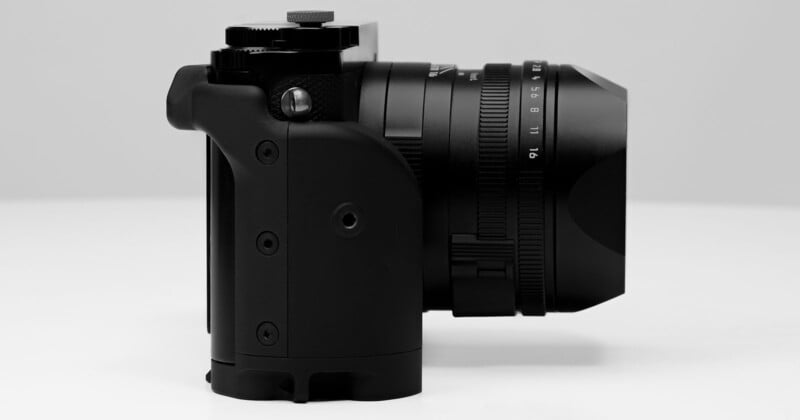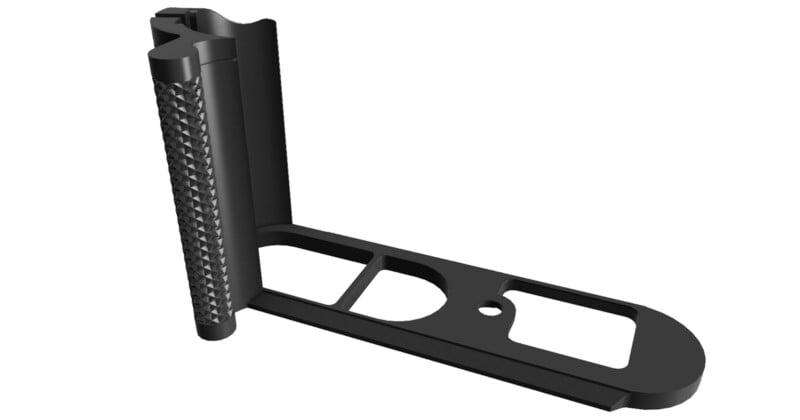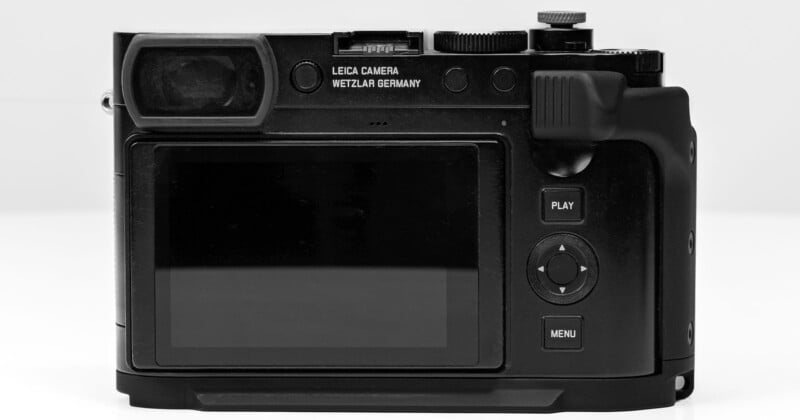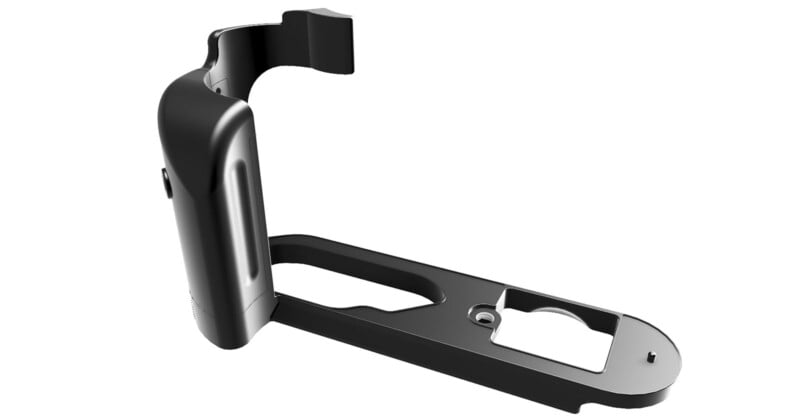![]()
The Leica Q3 is an excellent camera and has the style and performance that Leica enthusiasts love. However, the camera’s grip has frustrated some, and a photographer and architect have teamed up to solve the problem.
Photographer Hugh Brownstone, also known for his production company, Three Blind Men and An Elephant, has worked for the past year with his dear friend and fellow photographer, architect Ed Palisoc, on the He3 Handgrip for Leica Q3. PetaPixel chatted with Brownstone, a longtime industry friend, and Palisoc about their Helium Design Lab project, their shared love of photography, and how they built their new Leica Q3 grip, which they (very fairly) describe as the best external camera grip ever made.
At a glance, the Helium Design Labs He3 Grip for the Leica Q3 is an all-in-one front grip, thumb rest, and tripod plate for the Leica Q3, machined from a single piece of aluminum. Unlike Leica’s official Q3 grip and thumb rest — which are two separate products — the He3 doesn’t block the battery and memory card slots or prevent the use of the camera’s hot shoe. Further, it works with Leica’s Finger Loop, securely and secretly stores an Apple AirTag, has a bottom anchor lug for different strap configurations, is Peak Design compatible, and has a built-in Arca-Swiss tripod mount.
How Two Passionate Photographers Turned ‘What Would We Want in a Leica Q3 Grip?’ Into a Real Product
Although Brownstone, a professional photographer, educator, and content creator, and Palisoc, an architect, have very different careers, their shared love for photography led to them starting Helium Design Lab, and making the new He3 grip.
Palisoc, who has been passionate about photography since his grandmother bought him a Canon film camera when he was 12, met Brownstone through YouTube. They got to talking, and Palisoc event went to one of Brownstone’s workshops. They became fast friends and after chatting about their experience with the Q3, began working on the He3 grip. After about a year and more than a hundred design prototypes, the product is finally available to order.
Each person brings unique and rare complementary skills. Brownstone has spent decades working with a lot of cameras, and he knows what he — and other photographers — like and dislike about camera designs. He has an acute attention to detail. Palisoc understands form, function, and physics and can create the 3D models required for a project like this.
“Ed is brilliant. He’s brilliant about doing things that people don’t see. Even the internals of the grip are unique,” Brownstone says.
“The time I’ve spent with you going over this project has set the bar of what it means to really work well with someone,” Palisoc says of working with Brownstone.

Unsurprisingly, the He3 grip project was instigated by Brownstone and Palisoc finding the Q3’s standard grip design a bit lacking. Further, while Leica has an optional grip for the Q3, it blocks the memory card and battery compartments. It supports wireless charging, but if a photographer wants to just swap the battery out in the field, they must entirely remove the grip. It’s not ideal from a workflow perspective.
The He3 grip addresses these issues, and does so much more. Every single aspect of its design, usability, and versatility has been considered — and considered again.
Palisoc has 3D modeling experience from his architecture career and access to a 3D printer at home, so he was able to constantly make revisions, print them, and test them out in his hands. The best of these prototypes were shipped to Brownstone so they could work together on further refinements based on his hands-on experience.

Design differences ranged from a centimeter here or there to a millimeter to a tenth of a millimeter.
Why get so precise with every curve and angle?
No Detail Is Insignificant When You Use Something All the Time
“Even the smallest sensation on the palm of your hand matters,” Palisoc explains.

Brownstone adds that good design should demand little attention from the user. If someone notices something that is off by the tiniest amount, it matters because these minor frustrations grow into something more significant when you use a product for years and live with it.
Brownstone and Palisoc know full well that Leica is incredibly thoughtful about how it designs its products. No detail is too small for the legendary German camera maker. So, it’s easy to dismiss some complaints online about certain aspects of the Q3’s design as overly nit-picky or unique to a specific person’s hand or workflow.

However, when enough people pick up on certain things or just wish a camera felt a bit different in the hand, it’s hard not to notice. While some love the Q3 for its svelte, compact design, others wish they could feel more purchase in the body and hold it more confidently while shooting.
As Brownstone often emphasizes, the best camera doesn’t add hurdles between the photographer’s idea and their photo. A camera must fade into the background to reduce any friction when creating images. Sure, the Q3 can do that for some people straight out of the box, but not everyone. Leica knows as much, given that it offers an OEM hand grip for the camera.

What Makes the He3 Grip Different
Beyond addressing shortcomings with the OEM add-on grip concerning battery and memory card slot access — users can easily access these with the He3 grip attached to the Q3 — the grip offers a huge amount of features.

There is a modular, removable thumb grip that attaches to the He3 grip, adding a comfortable place to put one’s thumb while shooting. This doesn’t block any of the Q3’s controls. Unlike some thumb grip add-ons, such as Leica’s own $230 thumb rest, it also doesn’t block the Q3’s hot shoe.
The grip has a slot to attach Leica’s finger loop accessory and works with Peak Design’s Capture Clip and Travel Tripod plate. The He3 grip also has a bottom anchor lug, allowing photographers to easily use a wrist strap rather than a more typical neck strap to hold the Q3.
The He3 grip, which also includes a bottom plate for the Q3 for a bit more grip space, is Arca-Swiss mount compatible, too, meaning that photographers don’t need a separate tripod plate or adapter for their Q3. There’s also an additional 1/4-20 screw mount to attach accessories to the camera.

The Leica Q3 is an expensive camera — $6,295, to be precise — so people rightfully want to protect it against theft. While an Apple AirTag won’t stop a camera from being stolen, it will make it easier to track, and the He3 grip has an anti-tamper slot inside for the AirTag. The AirTag cannot be accessed without removing the grip, and the grip has an anti-tamper screw.

Although it’s not visible from the product shots, the AirTag is slotted securely into the front grip of the He3. The precise internal design for the AirTag location is one of multiple patent-pending aspects of the He3 grip, and Brownstone and Palisoc are playing it very close to the vest and wouldn’t show the 3D model structure.
Further, the He3 grip is constructed using fully CNC-machined 6061-T6 aluminum, which makes it robust and lightweight.
Brownstone and Palisoc thought having the grip manufactured in the United States was very important, as it’s nice to make things locally when possible. Finding an operation that could handle a relatively low-volume order requiring sub-millimeter precision was difficult, but they did it. The grip is machined from a single piece of aluminum.

The effort and care they have put into the He3 grip for the Q3 will be simultaneously obvious and invisible to everyone who uses it. On the one hand, that the grip is so versatile and makes shooting with the Q3 a better experience will be immediately apparent, but the immense amount of work required to make a product that simply works is impossible to see from the outside. There is an inverse relationship between the precision with which something is made and the amount of attention it demands in use, especially when it’s a product a person holds and uses to achieve something else — like taking a photo.
“We have profound respect for each other and trust each other,” Palisoc remarks. “It’s a very rare thing.”
Thanks to their trust and ability to work together, Brownstone and Palisoc have created what looks to be the best third-party camera grip ever.
Pricing and Availability
For those fortunate enough to own a Leica Q3, the Helium He3 Leica Q3 Grip is available to preorder now for $480. While this is more than Leica’s OEM grip, keep in mind that Leica not only works at a much larger production scale, but when one purchases the grip, the wireless charger, and thumb rest attachment that blocks the hot shoe, the price adds up to $600.
Image credits: Helium Design Lab (Hugh Brownstone / Ed Palisoc
